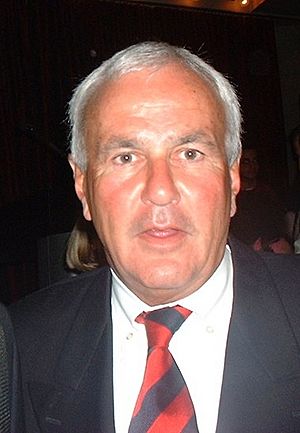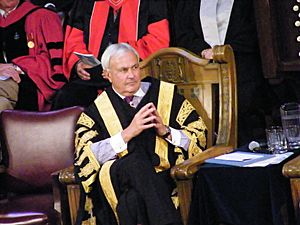David Peterson facts for kids
Quick facts for kids
David Peterson
|
|
|---|---|

Peterson in 2001
|
|
| 20th Premier of Ontario | |
| In office June 26, 1985 – October 1, 1990 |
|
| Monarch | Elizabeth II |
| Lieutenant Governor | John Black Aird Lincoln Alexander |
| Preceded by | Frank Miller |
| Succeeded by | Bob Rae |
| Member of Provincial Parliament | |
| In office September 18, 1975 – September 6, 1990 |
|
| Preceded by | New riding |
| Succeeded by | Marion Boyd |
| Constituency | London Centre |
| Ontario Liberal Party Leader | |
| In office February 21, 1982 – September 6, 1990 |
|
| Preceded by | Stuart Smith |
| Succeeded by | Robert Nixon |
| Leader of the Opposition in the Ontario Legislature | |
| In office February 21, 1982 – June 26, 1985 |
|
| Preceded by | Robert Nixon |
| Succeeded by | Frank Miller |
| Chancellor of the University of Toronto | |
| In office July 1, 2006 – June 30, 2012 |
|
| Preceded by | Vivienne Poy |
| Succeeded by | Michael Wilson |
| Chair of the Toronto Organizing Committee for the 2015 Pan and Parapan American Games | |
| In office January 21, 2010 – August 15, 2015 |
|
| Leader | Mario Vázquez Raña Julio Maglione |
| Preceded by | Aurelio Lopez Rocha (Guadalajara 2011) |
| Succeeded by | Carlos Neuhaus Tudela (Lima 2019) |
| Personal details | |
| Born |
David Robert Peterson
December 28, 1943 Toronto, Ontario, Canada |
| Political party | Liberal |
| Spouse | Shelley Peterson |
| Relations | Jim Peterson (brother), Tim Peterson (brother), Deb Matthews (sister-in-law) |
| Children | 3 including Ben Peterson |
| Residences | London, Ontario, Canada |
| Alma mater | University of Western Ontario University of Toronto Faculty of Law |
| Profession | lawyer |
David Robert Peterson (born December 28, 1943) is a Canadian lawyer and former politician. He served as the 20th premier of Ontario from 1985 to 1990. When he became premier, he was the first member of the Liberal Party to hold the job in 42 years.
Contents
Early Life and Family
David Peterson was born in Toronto, Ontario. His parents were Clarence and Laura Peterson. He has two brothers, Tim and Jim, who also became politicians. His family moved to London, Ontario, where his father started a wholesale electronics business.
Peterson went to the University of Western Ontario and then studied law at the University of Toronto. After finishing school, he became a lawyer. He also took over his father's electronics company and became its president when he was 26 years old.
In 1974, Peterson married actress Shelley Matthews, and they have three children. His family is very involved in politics. His brother Jim was a federal Member of Parliament, and his brother Tim and sister-in-law Deb Matthews were both elected to the Ontario legislature.
Journey into Politics
In 1975, Peterson was elected to the Ontario legislature as a Liberal Party member for the area of London Centre. A person elected to the legislature is called a Member of Provincial Parliament, or MPP.
Becoming Liberal Leader
Just a year after being elected, Peterson tried to become the leader of the Ontario Liberal Party but lost by a very small number of votes. He was still young and new to politics. He was re-elected as an MPP in 1977 and 1981.
In 1982, he ran for the party leadership again. This time, he won and became the new leader of the Ontario Liberal Party. As leader, he also became the Leader of the Opposition, which is the main person who challenges the government in power.
The 1985 Election
In 1985, an election was held in Ontario. The Progressive Conservative party had been in power for 42 years. Peterson campaigned with a lot of energy and presented himself as a modern leader.
The election results were very close. The Progressive Conservatives won 52 seats, and Peterson's Liberals won 48 seats. This meant no party had a majority. The third party, the New Democratic Party (NDP), led by Bob Rae, held the remaining seats.
The NDP decided to support the Liberals. They signed an agreement called the "Liberal-NDP Accord." In this deal, the NDP agreed to vote with the Liberals for two years, and in return, the Liberals agreed to pass some laws that the NDP wanted. This allowed David Peterson to become the Premier of Ontario.
Premier of Ontario (1985-1990)
On June 26, 1985, David Peterson was sworn in as the 20th Premier of Ontario. His government was a minority government, meaning it needed the support of another party to pass laws.
After two years, the agreement with the NDP ended. Peterson called another election in 1987. This time, the Liberals won a huge victory with 95 out of 130 seats. This gave them a strong majority government.
Major Changes in Ontario
As premier, Peterson's government made several important changes:
- It stopped doctors from charging patients extra fees above what the government health plan covered.
- It introduced laws for pay equity, to make sure women and men were paid equally for similar work.
- It kept a promise to provide full government funding for Catholic high schools.
- It passed new laws to protect the environment and brought in no-fault car insurance.
The Meech Lake Accord
Peterson played a big role in trying to change Canada's constitution through the Meech Lake Accord. The goal was to get the province of Quebec to agree to the constitution.
The accord was very controversial. Some people thought it gave too much power to the provinces, especially Quebec. Peterson's support for the accord hurt his popularity. In the end, the accord failed because not all provinces agreed to it.
A Surprise Election Loss
In 1990, Peterson decided to call an election, even though his government was not yet three years into its four-year term. Many people, including some in his own party, thought this was a mistake. They felt it was arrogant to call an election so early.
At the start of the campaign, the Liberals were popular. But many voters were unhappy with the early election call. Protesters often followed Peterson, and the media began to criticize his government.
On September 6, 1990, the NDP, led by Bob Rae, won a surprise victory. The Liberals lost badly, going from 95 seats down to just 36. Peterson even lost his own seat in London Centre. That night, he resigned as leader of the Liberal Party, ending his political career.
Life After Politics
After leaving politics, David Peterson returned to his career as a lawyer. He became a senior partner at a large law firm in Toronto, where he advises clients on government issues.
He has stayed active in many areas. He was the founding chairman of the Toronto Raptors basketball team and was part of the committee that tried to bring the Olympic Games to Toronto. From 2006 to 2012, he served as the Chancellor of the University of Toronto.
Peterson has also been on the board of directors for several large companies, including Rogers Communications. In 2020, he became part of a group that bought Torstar, the company that publishes the Toronto Star newspaper. He now serves as the chair of the Torstar board.
See also
 In Spanish: David Peterson para niños
In Spanish: David Peterson para niños
 | William L. Dawson |
 | W. E. B. Du Bois |
 | Harry Belafonte |


